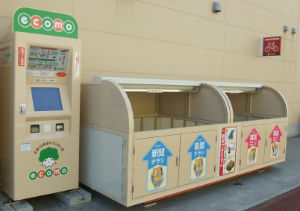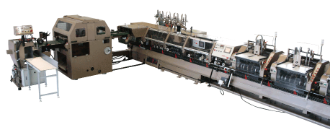Here are examples of the efforts we are making to create a prosperous future while reducing environmental impacts with an aim to construct a recycling society.

|
Office ecomo is a new recycling system for confidential documents. This system helps companies cut down on the time and trouble involved in having to shred the huge amount of confidential documents they produce, allowing them to contribute to environmental protection. |

|
Town ecomo is a recycling system in which the paper waste generated by households is collected and recycled. Under this system, recycling boxes for collecting recovered paper are placed in retail stores such as supermarkets. Customers bring old newspapers and magazines from home and deposit them in the boxes when they go shopping at the store. Because the frequency of recovered paper collection by local governments varies from region to region, people tend to accumulate paper waste at their homes, where it is collected less often. Taking advantage of Town ecomo, they not only can get rid of paper waste whenever they want, but also receive points based on the weight of the paper that can use while shopping. This helps retail stores encourage customers to come back again, and serves as an activity they can advertise as part of their ecological contribution. |

|
BMecomo is a service that helps maximize revenue for biomass power plants that are in continuous operation on a daily basis. In order to achieve this, the service involves the collection and analysis of all forms of data obtained from biomass power plants through use of the latest technology, as well as a thorough visualization of the data. Biomass power plants use naturally-sourced fuels that are not uniform in quality. Gathering operational expertise and passing it on is indispensable when handling fuels that may vary from day to day and hour to hour. BMecomo uses advanced IoT management to facilitate both the maintenance of improved combustion efficiency and maximum power generation, as well as the passing on to future generations of operators the expertise that skilled veteran operators draw on to achieve this. Furthermore, it supports the achievement of long-term, sustainable operations and management, along with various methods of problem resolution related to the handling of issues arising from equipment use from day to day. |
Japan boasts a top-class ranking among the world’s nations with its recovered paper utilization rate of approximately 65%. Underpinning this high recycling rate is Japan’s recycling system, which integrates three distinct components: the disposal of sorted waste by both households and businesses, the collection of recovered paper, and the papermaking industry. At present, as efforts to meet the Sustainable Development Goals (SDGs) have come to be commonly recognized as matters of global importance, the material recycling of recovered paper is progressively diversifying while other, new client-spearheaded initiatives have emerged as well. Some KPP clients are beginning to take the initiative to collect paper products, such as cardboard, that have been used in their own goods, while they also promote recycling of their resources with beginning-to-end responsibility. KPP feels there is a high probability that such efforts will proliferate in the future. In the context of such trends, KPP implements a consolidated management system that first offers the provision of paper, which can be viewed as representing the “arteries” of the system, and then the collection of recovered paper, representing its “veins.” Together, these support the realization and visualization of a resource recycling loop wherein the recovered paper generated is restored to paper products that clients can make use of once again. Through this business approach, KPP aims to support their clients’ environmentally-focused activities as well as contribute to the realization of a sustainable recycling-oriented society.
Catalogs and pamphlets are normally bound using wire and paste. However, we can reduce the environmental impact if we use the minimum amount of materials.
To this end, we propose Eco Press Binder, which merely employs a tooth-form press to bind books. It can bind up to 30 pages, depending on paper quality and thickness. There is no concern about personal injury caused by the wire. This binding method is recommended for companies who wish to advertise their strong commitment to reducing their environmental impact.


